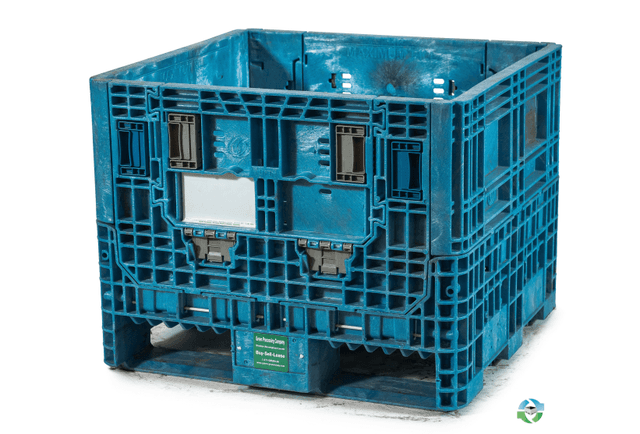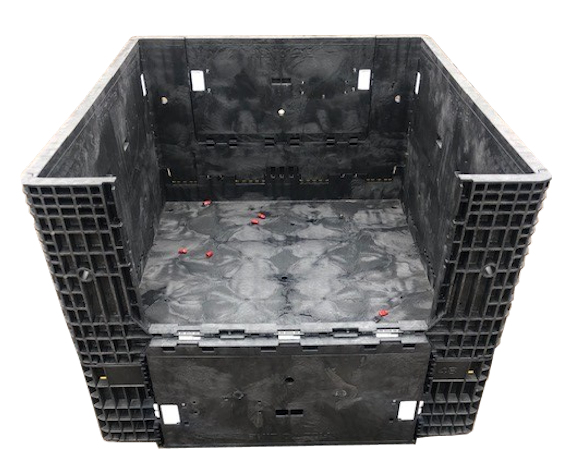Why Bulk Containers Are Vital for Affordable and sustainable Transport
Bulk containers play a vital duty in contemporary logistics. They assist in the effective activity of large quantities of goods, thus maximizing transport processes. This technique not only reduces expenses but also lessens environmental impact through reduced discharges and waste generation. As sectors seek more lasting techniques, the fostering of bulk containers is coming to be progressively considerable. What ramifications does this change hold for future logistics and supply chain administration?

The Benefits of Using Mass Containers in Logistics
Mass containers change logistics by enhancing performance and sustainability. These containers permit the transport of big quantities of goods in a solitary journey, markedly lowering the variety of journeys called for. This not just simplifies operations however likewise decreases labor prices connected with handling, loading, and dumping. Additionally, mass containers are developed to optimize room application within transportation cars, ensuring that even more items can be shipped concurrently.
The standardization of mass containers also streamlines the logistics process. With uniform measurements, they can be easily piled and kept, bring about boosted warehouse administration. Mass containers commonly include resilient materials that protect components from damage during transit, consequently reducing item loss and increasing overall integrity. Because of this, organizations can experience enhanced supply chain efficiency, ultimately bring about enhanced profitability and consumer complete satisfaction. This mix of factors makes bulk containers a critical property in modern logistics.
Ecological Effect: Decreasing Waste and Carbon Footprint
As markets progressively focus on sustainability, the fostering of bulk containers has actually become a vital method for decreasing waste and reducing carbon impacts. These containers minimize the use of packaging materials, such as boxes and plastic, consequently especially lowering total waste generation. By consolidating deliveries, bulk containers boost transport effectiveness, enabling even more products to be transported per trip. This reduction in journeys straight associates with reduced greenhouse gas exhausts, adding to a smaller carbon footprint.
Bulk containers can typically be recycled or recycled, even more minimizing ecological influence. The durability of these containers warranties they can withstand multiple transport cycles, minimizing the need for single-use options. used plastic containers. By streamlining logistics and promoting efficient source usage, mass containers not just support sustainable methods however likewise motivate sectors to straighten with global ecological objectives. Inevitably, their implementation mirrors a dedication to eco-friendly stewardship and responsible resource management
Cost Financial Savings: Exactly How Bulk Containers Lower Transportation Expenses
While numerous business seek ways to enhance their bottom line, the usage of mass containers provides a substantial chance for lowering transportation costs. Bulk containers make best use of the quantity of products delivered, allowing businesses to deliver larger quantities at the same time. This performance minimizes the number of journeys needed, straight decreasing gas costs and lessening labor costs connected with loading and dumping.
In addition, bulk containers often feature structured styles that optimize room use within transport lorries. This means less voids, causing more reliable use readily available capability. The resilience of mass containers can reduce the threat of item damage throughout transit, making certain and decreasing losses that even more goods get here intact.
Enhancing Supply Chain Performance With Bulk Storage Space Solutions
Bulk storage space solutions play a crucial role in enhancing supply chain performance by optimizing stock monitoring. By settling items right into fewer, larger containers, services can significantly lower handling costs connected with regular transfers and handling. This structured approach allows for much better monitoring and management of supply, eventually resulting in boosted operational performance.
Structured Supply Management
Effective inventory administration is necessary for maximizing supply chain procedures, particularly when companies take on bulk storage space remedies. These remedies allow companies to keep higher supply degrees while minimizing the frequency of replenishment. By consolidating products right into mass containers, firms can enhance their inventory processes, lowering the intricacy connected with tracking several smaller packages. This method assists in accurate inventory matters and enhances forecasting accuracy, enabling even more informed decision-making. In enhancement, bulk storage remedies streamline storehouse organization, making it easier to situate and gain access to items when needed. Because of this, organizations can achieve an extra effective inventory turn over rate, ultimately boosting total supply chain performance and reducing the probability of stockouts or overstock circumstances.

Lowered Handling Prices
The execution of mass storage space options not only streamlines supply management yet likewise substantially decreases handling expenses throughout the supply chain. By settling materials right into bulk containers, companies minimize the demand for regular handling and transfer between different storage and transport devices. This technique cuts down on labor costs connected with loading, discharging, and relocating smaller sized bundles. In addition, mass storage space reduces the frequency of shipments, causing reduced transport expenses and reduced gas intake. Therefore, services can maximize their logistics procedures, allowing for a much more effective allowance of sources. Inevitably, lowered handling costs contribute to enhanced general supply chain effectiveness, cultivating an environment that supports both sustainability and economic viability.

Flexibility of Mass Containers Throughout Different Industries
Although many markets have distinctive needs for transportation and storage, mass containers have arised as a flexible service that meets a vast array of needs. These containers, varying from huge bins to specialized storage tanks, can fit varied products, including liquids, powders, and granules. In the agricultural industry, mass containers facilitate the transportation of fertilizers and grains, while the food and beverage industry uses them for active ingredients and finished items. The chemical industry relies on mass containers for safely delivering hazardous materials, making certain conformity with safety laws. In addition, building and construction companies profit from mass containers for delivering accumulations and other materials. Their adaptability reaches numerous settings of transport, consisting of ships, trains, and trucks, improving logistical effectiveness. This adaptability not just simplifies procedures across different industries but also advertises sustainability by decreasing product packaging waste and maximizing area in transit. Bulk containers play a crucial duty in modern supply chain management.
Future Trends wholesale Container Usage and Sustainability
The future of mass container usage is increasingly formed by cutting-edge materials development that boosts sustainability. Furthermore, automation in logistics promises to simplify operations, reducing waste and boosting efficiency. Welcoming round economic climate practices will certainly additionally revolutionize just how bulk containers are developed, used, and reused, fostering a much more sustainable transportation landscape.
Cutting-edge Materials Development
As markets significantly prioritize sustainability, innovative materials growth wholesale containers becomes a substantial consider boosting environmentally friendly transport options. Suppliers and researchers are exploring naturally degradable plastics, recycled compounds, and lightweight metals to minimize ecological influence. These products not only decrease waste yet likewise boost fuel effectiveness by lowering the overall weight of containers. Furthermore, advancements in wise products, which can adapt to varying problems, improve the resilience and capability of mass containers. The combination of these cutting-edge products straightens with round economy principles, promoting reuse and recycling. As the demand for lasting techniques expands, the growth of such materials will play an important duty in forming the future of mass container usage in logistics and transportation.
Automation in Logistics
Considerable advancements in automation are positioned to change logistics and website the application of mass containers, boosting sustainability in transport. Automated systems, including drones and autonomous vehicles, are simplifying the activity of mass containers, minimizing the reliance on conventional fuel-powered transport. These technologies optimize transmitting and filling procedures, lessening empty miles and enhancing gas performance. Furthermore, automated stock management systems boost monitoring and tracking of mass containers, making certain far better resource allocation and lowered waste. The integration of the Internet of Points (IoT) permits real-time data evaluation, making it possible for aggressive decision-making that straightens with sustainability objectives. As automation proceeds to develop, it is expected to drive better technologies in mass container usage, eventually supporting even more lasting logistics practices and decreasing the environmental impact of transportation.
Circular Economic Climate Practices
Innovations in automation are setting the stage for an extra incorporated technique to circular economic situation practices in the domain name of bulk container usage. As sectors significantly embrace sustainability, bulk containers are being designed for long life and reusability. This change not just decreases waste however likewise boosts resource performance. Business are taking on methods such as closed-loop systems, where made use of containers are collected, reconditioned, and reestablished into the supply chain. Furthermore, wise modern technologies track container life process, helping with far better monitoring and decreasing ecological impact. The cooperation between makers, logistics suppliers, and end-users is important in developing standards for lasting container usage. used collapsible bulk containers. Future fads show a growing emphasis on materials that are recyclable and naturally degradable, further strengthening the round economic situation's principles wholesale transport

Regularly Asked Questions
What Products Are Mass Containers Generally Made From?
Mass containers are normally built from durable products such as high-density polyethylene, light weight aluminum, cardboard, and steel. These products offer flexibility, security, and stamina, making them ideal for carrying numerous goods in various industries effectively.
Just how Do I Choose the Right Size Mass Container?
Choosing the right dimension bulk container includes reviewing the quantity of products to be moved, considering handling equipment compatibility, and evaluating storage area requirements. Correct size guarantees efficiency in transportation and reduces waste throughout delivery.
Are Bulk Containers Reusable or Recyclable?
Mass containers are typically recyclable, developed for numerous journeys, boosting sustainability. Many can likewise be reused, depending on the products used. Picking recyclable options additionally lowers and sustains ecological objectives waste in transportation methods.
What Safety Rules Apply to Bulk Container Transportation?
Safety regulations for bulk container transport consist of compliance with the Division of Transport standards, proper labeling of hazardous products, architectural honesty assessments, and adherence to weight limits to guarantee secure handling and protect against crashes throughout transportation.
Exactly How Can Organizations Change to Making Use Of Mass Containers Successfully?
Businesses can transform to bulk containers by evaluating current logistics, educating personnel on handling, investing in suitable tools, enhancing supply management, and working together with vendors to ensure compatibility and efficiency throughout the supply chain.
As markets progressively focus on sustainability, the adoption of mass containers has arised as a key method for lowering waste and reducing carbon impacts. By settling materials right into bulk containers, companies can enhance their supply processes, reducing the complexity linked with tracking numerous smaller plans. As industries progressively prioritize sustainability, ingenious materials growth in bulk containers arises as a significant variable in boosting green transport options. Automated systems, consisting of drones and autonomous cars, are enhancing the motion of mass containers, lowering the dependence on traditional fuel-powered transport. Additionally, automated inventory administration systems improve tracking and tracking of mass containers, guaranteeing better source allotment and minimized waste.